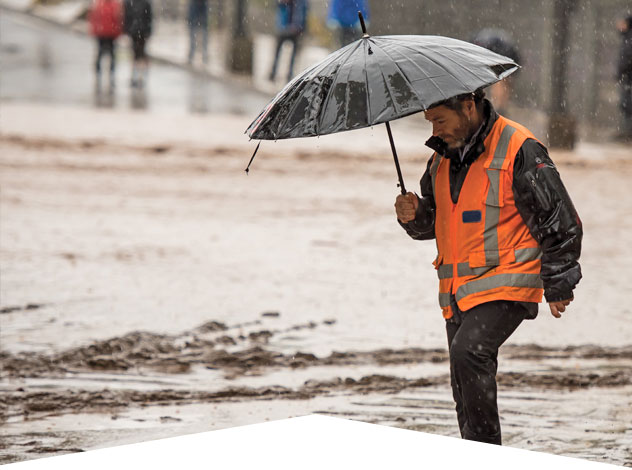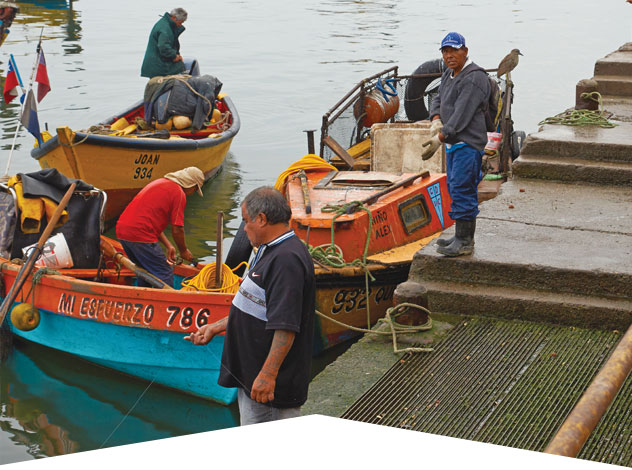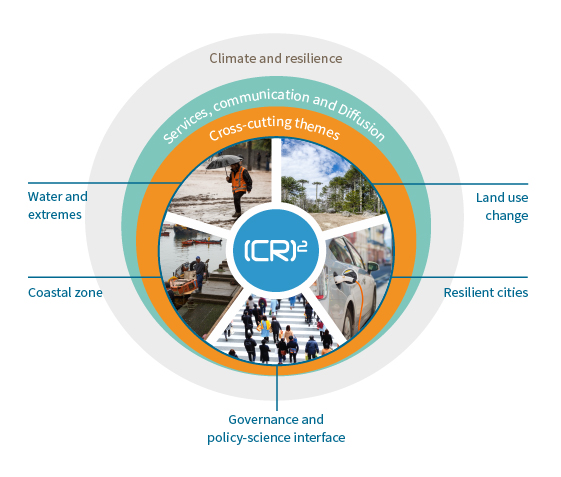In the second phase of work (2018-2022) (CR)² will maintain the same fundamental objectives of the first 5 years of the center: to deepen our understanding of the climate system, processes, and impacts throughout Chile, in a holistic manner that confronts the complexities of socio-ecological systems; to strengthen the emerging community of natural and social scientists in Earth System Science in Chile; and to contribute to the definition of climate change adaptation and mitigation measures for building societal resilience.
Research Proposal
Over the next five years, (CR)² will continue to work toward these overarching objectives while incorporating a long-term goal of becoming and remaining a major player in developing climate and resilience science and contributing to our country’s goals of achieving low-carbon sustainable development consistent with the Paris Agreement and the Sustainable Development Goals (SDGs).
(CR)² is organized around five complex research themes framed within climate variability and change and societal resilience.
These issues are addressed using approaches ranging from disciplinary to interdisciplinary studies that explore diverse issues and seek to achieve improved understanding for strategic development of the research lines. These problems are: water and extremes, coastal zone, land use change, resilient cities, and governance and science-policy interface.

Water and extremes
The objective of this research is to disentangle the role of natural variability and anthropogenic factors (either local or remote) as drivers of change in the distribution of extreme hydro meteorological events (frequency, extent, intensity) and their impact.

Land use change
The aim of this line of work is to design resilient landscapes for the sustained provision of ecosystem goods and services to cope with climate variability and change.

Resilient cities
The research team will assess the resilience capacities of Chilean cities to climate disturbances using both present day and future conditions, testing different emission scenarios and governance conditions.

Governance and science-policy interface
This line of work will assess governance modes compatible with a low-carbon economy and coherent with the Paris Agreement, SDG priorities, and Chile’s socio-economic conditions, emphasizing a sound and strengthened science-policy interaction.

Coastal zone
This research will identify the mechanisms by which climate variability and change affect coastal processes relevant to the functioning of Chilean ecosystems and society.
Simultaneously, and to produce more knowledge that supports decision-making, (CR)² generates, with an inter and transdisciplinary approach, cross-cutting themes, addressing integrative research questions (the first two already completed) with short- and medium-term objectives
Forest fires
 The research of the Chilean forest mega fires occurred in 2016-2017 in the frame of fire regimes variability in the last decades has a global scientific relevance. The study of this Chilean case can take it as a research model where key factors are in it extremes (drought, high temperatures and water deficit, homogeneous and flammable landscape dominated by exotic forest plantations). Understand forest fires is relevant to informing and interacting with politicians and decision-makers from public and private service responsible of prevention and fires extinction, and to guide the forestry managing decisions and promote less homogenies, stronger and resilient landscapes.
The research of the Chilean forest mega fires occurred in 2016-2017 in the frame of fire regimes variability in the last decades has a global scientific relevance. The study of this Chilean case can take it as a research model where key factors are in it extremes (drought, high temperatures and water deficit, homogeneous and flammable landscape dominated by exotic forest plantations). Understand forest fires is relevant to informing and interacting with politicians and decision-makers from public and private service responsible of prevention and fires extinction, and to guide the forestry managing decisions and promote less homogenies, stronger and resilient landscapes.
Atmospheric pollution
![]() The atmospheric pollution and climate change are inextricably linked. For that reason, should be addressed in a coordinated manner. Taking into account the links between these issues, it could development integral and sustainable politics to maximize the benefits to mitigate the atmospheric pollution and climate change. In response to this frame, our research will assess the governmental process and structures to address the air pollution and climate change, and explore actions to increase the resilience to cope this challenges. We focus in mobility and air quality links, policy-science interface, and citizen participation to increase the urban resilience.
The atmospheric pollution and climate change are inextricably linked. For that reason, should be addressed in a coordinated manner. Taking into account the links between these issues, it could development integral and sustainable politics to maximize the benefits to mitigate the atmospheric pollution and climate change. In response to this frame, our research will assess the governmental process and structures to address the air pollution and climate change, and explore actions to increase the resilience to cope this challenges. We focus in mobility and air quality links, policy-science interface, and citizen participation to increase the urban resilience.
Water security
 The study of water security can be addressed from different aspects (e.g., water quantity, quality and accessibility, human well-being, socio-economic development, ecosystems preservation, peace, and political stability), and from different territorial scales, all of which reveal different research gaps, impacts to be studied, and interaction with global change. The general objective of the integrative research is to assess water security in Chile at national to catchment to local scales over the last decades, considering the climatic, ecological, and societal factors that have influenced its trajectories, and to project the levels of water security in a context of adaptation to climate change.
The study of water security can be addressed from different aspects (e.g., water quantity, quality and accessibility, human well-being, socio-economic development, ecosystems preservation, peace, and political stability), and from different territorial scales, all of which reveal different research gaps, impacts to be studied, and interaction with global change. The general objective of the integrative research is to assess water security in Chile at national to catchment to local scales over the last decades, considering the climatic, ecological, and societal factors that have influenced its trajectories, and to project the levels of water security in a context of adaptation to climate change.
Harmful algal blooms (HABs)

The red tide occurred in summer and autumn of 2016 was the worst recorded in intensity, duration and extension terms in Chile. For this reason, (CR)² researchers was called to the Red Tide National Commission, by the Chilean government. (CR)² research aims to identify the climate attributes of the harmful algal bloom and improvement our short and medium terms capacities to predict, and then has a better understanding about the principal triggers of this events. The complexity of this events needs an interdisciplinary focus to improvement its understanding and also generate relevant science to elaborate public policies.


